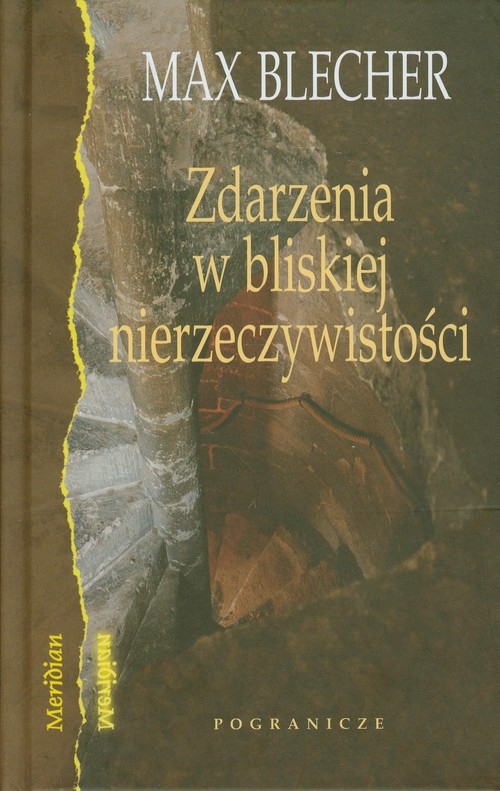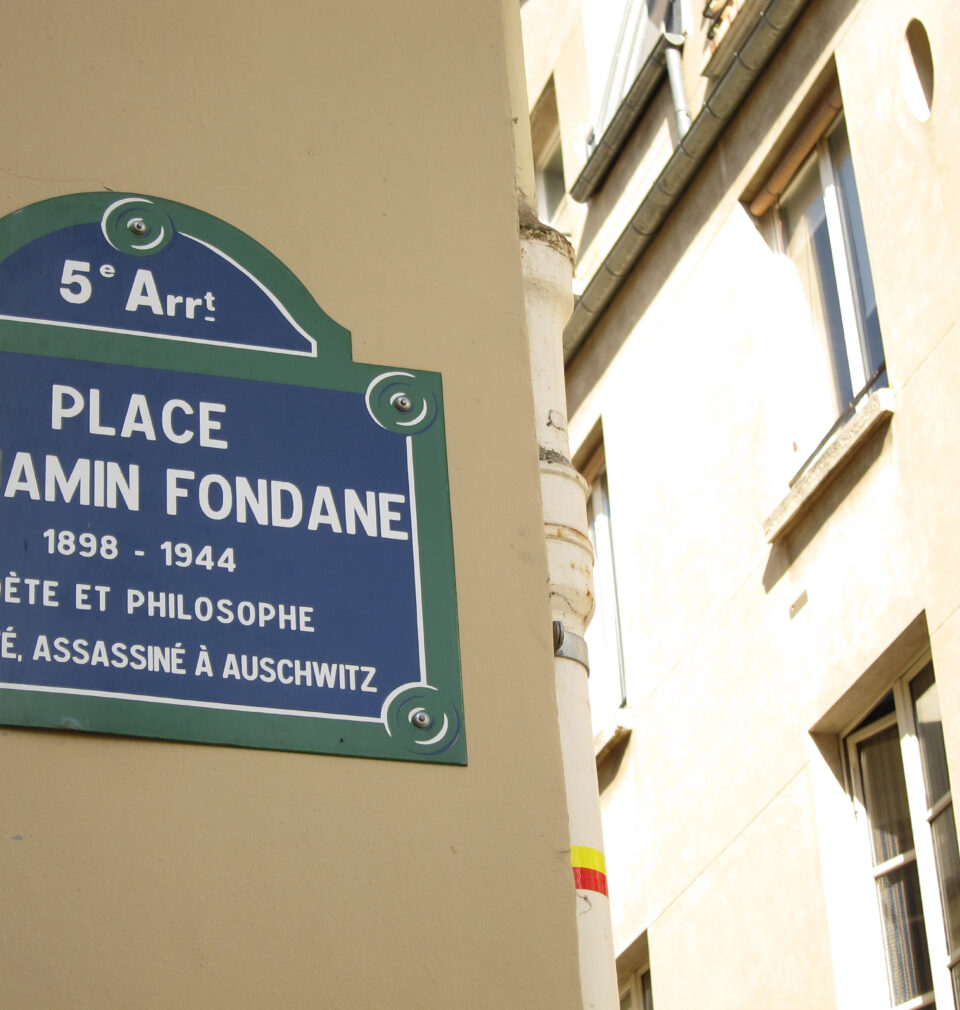
Rumunia - Romania - România
The Dark Revelations of Max Blecher
Publication: 15 October 2021
TAGS FOR THE ARTICLE
TO THE LIST OF ARTICLESMax Blecher, Zdarzenia z bliskiej nierzeczywistości (Adventures in Immediate Unreality), translated into Polish by Joanna Kornaś‑Warwas Pogranicze Publishing, Sejny 2013
Imagine you sit down at a desk with an intent to describe a certain event in an ordinary, realistic way, when all of a sudden it strikes you that all real events are no more than appearances and pretexts, and people are only random shapes – masks which secretly hide a dark and anonymous force. Isn’t our contem‑ porary arrangement of forms and norms merely a moment in development? And doesn’t it seem as if the same idea constantly acquires new forms, as if the force was to present itself in constantly new, random characters, and so a frightened man, who is only an ephemera, but the fear within him – something lasting and unchangeable? Blecher followed the path of such sensation. His writing brings out the sense of dread and strangeness of the spectacle.
Sounds familiar? It should because the paragraph above is partially a paraphrase, partially a summary of an excerpt from Witold Gombrowicz’s review of Sanatorium Under the Sign of an Hour‑Glass. Schulz’s name has been changed.
Romanian author, Max Blecher is a kindred spirit to Schulz. He entered the literary world in the same era and with the same style. He was an outstand‑ ing writer, who created in the atmosphere of – in his own words – “provincial uselessness”, and stayed in touch with literary circles by means of correspond‑ ence. As a writer he took from his private observa‑ tions and experiences, but he also searched for inspiration in numerous works of literature, which provided him mostly with general notions, energy and boldness rather than specific ideas. His most significant novel, Întâmplări în irealitatea imediată (Adventures in Immediate Unreality), beautifully translated by Joanna Kornaś‑Warwas, has just been published in Poland as Zdarzenia z bliskiej nierzeczywistości.
Similarly to Schulz, Max Blecher grew up in a Jewish merchant family, but of a significantly better status. His father had a prospering china shop in Roman and he could afford to send his gifted son to medical school in Paris. From his early years Blecher showed all the markings of a remarkable mind: he wrote poems and essays, and at the age of 16 had his first review published in one of the most prominent magazines in Bucharest. His Parisian adventure did not last long, as at the age of 19 Blecher was diagnosed with spinal tuberculosis. After his return to Romania, the young writer spent the next ten years – until his death in 1938 – trapped in a stiff plaster corset. He read and wrote in a reclined position, resting his knees against a sort of a kneeler, while constantly coping with recurring, intense pain.
“I left overpowered and exhausted” – wrote Mihail Sebastian, who visited Blecher in Romania in Septem‑ ber 1936. “He lives in intimacy with death. Not with the abstract, unclear, long‑term death. It’s his death, precise, defined, known in every detail, just as an object. What gives him courage to live? What gives him support? He does not seem devastated. I do not understand, I have to admit, I do not understand. I wanted to burst into tears a few times when looking at him. At night I heard him moaning and screaming in his room, and I felt that there was another person at home with us, maybe death or faith – I don’t know who.” (quoted from Mihail Sebastian’s Journal 1935–1944: The Fascist Years).
Despite living in these circumstances Blecher carried on quite a correspondence (with André Gide and Martin Heidegger, to name a few), worked on translations, wrote articles and novels. Although favorable reviews of Adventures did not gain him popularity, they gave him a permanently high position in the literary pantheon. In Poland, however, none of his books were published for decades. Just like every “different” and original author, he had to wait for his moment, which came late – on the 75th anniversary of his death.
Blecher’s subject is the veneer of life and what is hidden behind it. His protagonist, who also narrates the story, experiences the world intensively and analytically at the same time; sensuality and intellectuality fight a constant battle in his work. The strength of Blecher’s prose lies in visual suggestiveness and metaphors. In one of the scenes the protagonist observes meat being unloaded in front of butchers’ sheds. The butchers carry “whole halves of cattle in their arms, crimson and veined, moist with blood, tall and superb like dead princesses”. This description develops accordingly to the logic of a previously used, surprising metaphor: “They were now lined upagainst white porcelain walls like red sculptures chiseled from the most varied and fragile material […] At the edge of the open stomach hung the lacework of muscles and heavy necklaces strung with beads of fat.”
Another scene: the protagonist’s friend gets engaged to a woman, who quickly entraps the mind of the young narrator. These thoughts soon wind up stuck in paradoxes: “Edda became one more object, a simple object whose existence tormented and irritated me, like a word repeated innumerable times, that becomes incomprehensible to the extent that its comprehension seems to us more imperiously necessary.” Edda becomes Schulz’s Adela of sorts – her terseness, or even her mere existence ridicules all the protagonist’s efforts to prove to himself and others that true life is absent. But, as it turns out with time, this is an imperfect Adela – Adela affected by disintegration. This way she becomes the young man’s unexpected ally, thanks to whom his process of self‑recognition reaches a new level.
“Nothing existed in the world outside of the mud” – this discovery made by the protagonist sounds familiar and unexciting. The scene that precedes it however, is brilliantly constructed: the protagonist sets out on a rainy night to a cattle market to immerse himself in mud and manure. He says: “I myself was a special creation of the mud; a missionary sent by it into this world. […] This was my authentic flesh, clothes flayed, skin flayed, muscles flayed, flayed to the mud core.”
In Blecher’s prose, “mud” stands in opposition to a perfect, closed, tamed reality. Life, as we may read in Adventures, brings only dark revelations: there is no “truth superior to the mud”, the essence of life cannot be uplifted or redeemed (what is interesting, Blecher’s novel, unlike Schulz’s, is almost entirely devoid of religious elements). Paradoxically, the mere character of the story states it differently. Its “sensuality” and “intellectuality” are not made of mud. It is a construction raised with precision and due diligence, put together carefully and without haste. Blecher’s excellence is undeniable. Although belatedly, it is good to be introduced to this writer.
Translated from the Polish by Joanna Dziubińska
Copyright © Herito 2020



